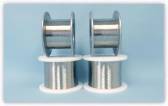The character traits of nickel alloys can sometimes be more useful than those of brass, copper, and beryllium. This is especially the case when using the wire outdoors. Nickel wire has the ability to resist corrosion at extremely high levels. It is able to resist oxidization from air and water, and it can withstand contact with acids and alkalis. The top layer of nickel is a protective layer, which protects the compound from chemicals. The process of creating this layer is called passivation. Nickel is considered a non-reactive metal that will dissolve slowly in acids.

Nickel wire is also commonly used for its ability to resist melting. Other metal alloys have a low melting point, but that is not the case for nickel. Nickel can withstand temperatures up to 2,600 degrees Fahrenheit (1,203 Celsius). The wire is also strong and it can withstand extensive wear and tear. It can also be stretched easily.
Nickel wires do have a strong magnetic property, but this is only the case when the wire has not been heated. Nickel wire will lose its magnetic abilities when heated to about 350 degrees Fahrenheit.
Beryllium Copper
Nickel wire is sometimes more appropriate for certain application, and in those cases it should be used instead of beryllium copper wire and phosphor bronze wire. For more information about the properties and use of nickel wire, give us a call today!
Related Reading

 Technical Data
Technical Data


